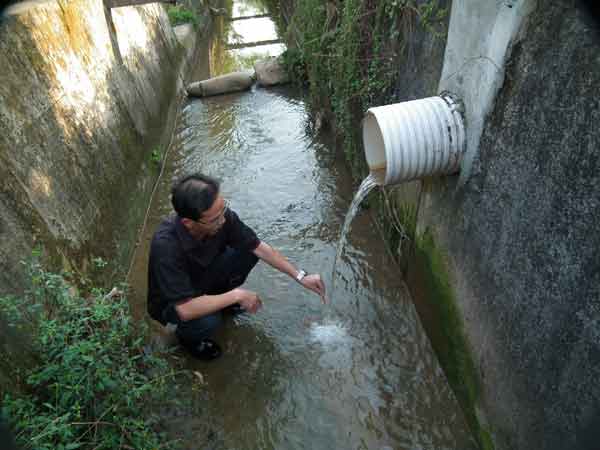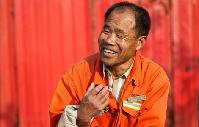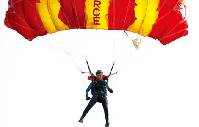Watching the water
Updated: 2013-11-06 10:10
By Wu Ni (China Daily)
|
||||||||
 |
|
Dong tests the quality of wastewater discharged from a factory with a pH test strip. |
Villagers had complained to the local environmental protection bureau but did not receive any response, so Dong turned to the media for help. After the incident was exposed on the Zhejiang TV station, the chemical factory was ordered to shut down until it had qualified wastewater treatment equipment.
| Not talking trash |
It was no secret that companies unwilling to invest in wastewater treatment equipment would stealthily drain wastewater and the government sometimes turned a blind eye because many of these factories are major taxpayers and employers, Dong says.
Quzhou has established seven industrial development zones and is the home to the biggest fluoride chemical base in China. Municipal government statistics showed the city's chemical industry contributed 23.98 billion yuan ($3.93 billion) in production value last year.
Dong admits that environmental protection bureaus would act much quicker when the media get involved but he tries to avoid the situation because "the exposure, more or less, would embarrass local authorities while a cooperative relationship would be conducive to the cause".
In many cases, factories accumulated untreated wastewater and piped it out deep in the night or on rainy days, Dong says: "The more heavily it rains, the more important it is we take action."
Some factories transported wastewater with trucks and poured on the mountain. To collect evidence, Dong even pretended to be a doctor of traditional Chinese medicine scouting for herbs on the mountain.
Once, volunteers secretly followed a truck and took photos to record how untreated wastewater was poured on a nearby mountain. They were discovered by the factory's security guards, who confiscated their camera. Luckily, Dong had taken out the memory card before the guards took the camera.
Dong was fully equipped to look for hidden outlets: He had a camera for collecting visual evidence, a flashlight for night patrols, insect repellent used in some pollution outlets and long rubber boots because he often had to wade through polluted water, and most importantly, the pH test strips.
For more China Face, here

 Slovak flying car
Slovak flying car
 US, Russia fail to agree Syria peace talks date
US, Russia fail to agree Syria peace talks date
 India launches exploratory spacecraft to red planet
India launches exploratory spacecraft to red planet
 Taking risks in a firestorm
Taking risks in a firestorm
 Biden to emphasize Asia pivot on tour
Biden to emphasize Asia pivot on tour
 China vows to cooperate in global fight against ivory smuggling
China vows to cooperate in global fight against ivory smuggling
 US mall on lockdown after shots heard
US mall on lockdown after shots heard
 Blackhawks honored at White House
Blackhawks honored at White House
Most Viewed
Editor's Picks

|

|

|

|

|

|
Today's Top News
China seeks cooperative efforts on nuclear safety
Shanghai still the favorite city for expats
Venezuela says US spies on it for resources, oil
More direct flights to tourist destinations
Brazilian govt to use anti-spying email system
US media under attack for 'double standards' on terror
Alipay partners with UATP
 Minister proposes security fix
Minister proposes security fix
US Weekly

|

|









